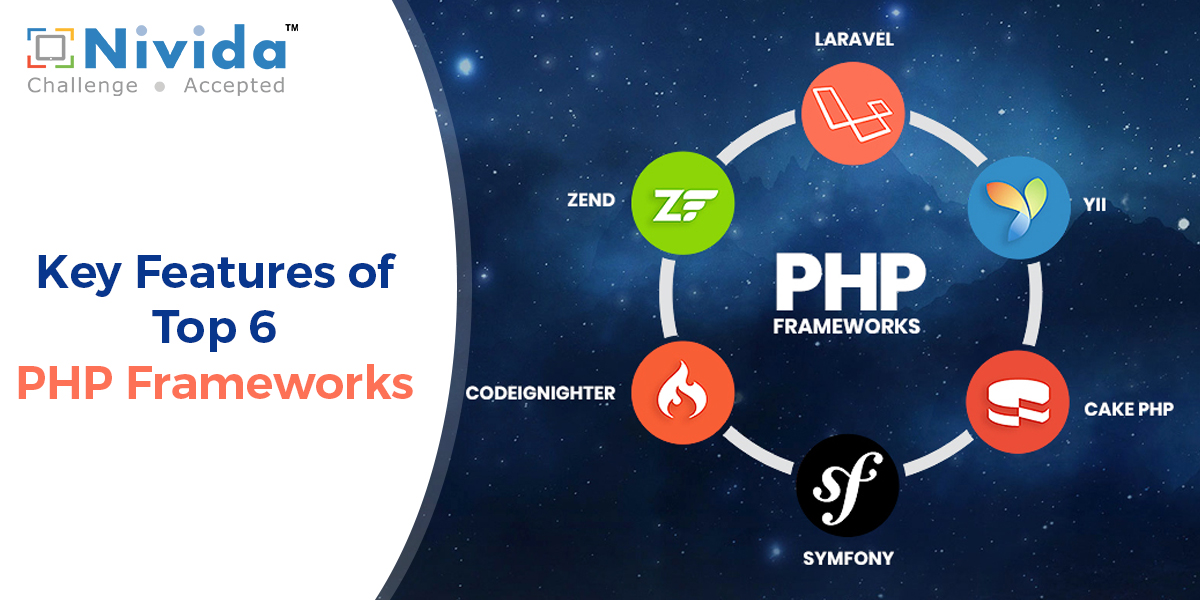For web development, we have chosen the best six PHP frameworks. Choose the one that best fits your project's requirements, as they are all distinct.
These frameworks are all free and open-source. This means you can try out a variety of options until you find the best fit.
- Laravel:
- Packages of Laravel features
- The functions are already built in.
- In a Laravel Homestead setting
- Pro-Active community of coders and programmers
- CodeIgniter:
- Lightweight framework
- Excellent documentation
- MVC architecture support
- Built-in security features
- Symfony:
- Individual components settings
- Built-in debugging
- Twig template engine
- Excellent documentation
- Laminas Project:
- MVC architecture
- External libraries Integration
- Need-to-use components are only allowed to use
- MVC and Laminas Components. Components of PHP applications such as input validation, dependency injection, as well as parsing can be found in the core PHP framework.
- Mezzio. A framework for creating applications in the PHP middleware environment that uses PSR-15 as well as PSR-7 to manage HTTP requests.
- Development Instruments for APIs. RESTful API generator supporting HTTP/1.1. Validation, authorisation, and authentication functions can also be implemented with these technologies.
- Phalcon:
- Completely based on programming language C
- Superb efficiency with minimal overhead
- Allows for selective library and module addition
- CakePHP:
- Code standards followed by CakePHP
- Distinct elements
- Several different avenues of help
Key Features:
Laravel is a large PHP framework that has gained acclaim for its clean syntax. It's a great tool for tailoring advanced applications thanks to its many features and pre-built operations. Authentication, caching, as well as session management, are all features.
There are further packages that can be used to add functionality to the framework. Framework-independent packages can be used with any PHP framework, while Laravel-exclusive packages can only be used with Laravel.
A well-known package is Laravel's Debugbar, which provides a debugging toolbar for the application.
Instead, you can use Packalyst, a catalogue of more than 15,000 pre-built Laravel packages, to expedite your work. Putting in a request for a certain bundle is an option if you can't locate what you're looking for.
Also, Laravel Homestead is a bonus as well as a virtual computer for local web development, provided as a preconfigured Vagrant box. This allows web developers to build PHP web applications locally without using a web server.
If this is your first time working with a PHP framework, Laravel's tutorials as well as robust community forums make it a great option. As a result, PHP and Laravel are both accessible to newcomers.
Key Features:
CodeIgniter is a PHP framework that weighs in at under 1.2 megabytes. It makes page refreshes quicker and reduces the burden on your server and programmes.
The MVC as well as non-MVC design patterns available in CodeIgniter demonstrate the framework's adaptability. Developer teams of any size can benefit from its MVC framework, which streamlines the coding process, but smaller groups or solo programmers can get by just fine without it.
Furthermore, this framework has first-rate safety features integrated right in. Context-aware escape, content security standards, and safeguards against XSS and CSRF are some of them.
In general, CodeIgniter's reliable performance is ideal for small web apps that run smoothly on inexpensive PHP hosting.
Key Features:
Symfony employs a modular component approach and is a very adaptable PHP framework. There are more than fifty pre-built PHP modules available for reuse in your next project. You can pick and choose which parts of the library to use, rather than having to use it all, if you simply need minimal assistance.
Symfony also takes advantage of Twig, a lightning-quick and succinct template engine. You may rest assured that your project will function as expected thanks to its integrated debugging tool.
However, Symfony's steep learning curve is a major drawback. To counter this, Symfony provides extensive documentation and guidelines covering 20+ distinct areas of study.
Key Features:
In contrast to Zend, which was abandoned after its initial release, Laminas is a continuation of the PHP framework. Being component-based has earned Laminas Projects the nickname "glue" among developers.
There are three sections to the Laminas Project:
The Laminas is an object-oriented, MVC framework that allows you to selectively load only the libraries you need. The components and MVC framework are also ideal for web applications because they adhere to enterprise development best practices.
This method, together with the object-oriented architecture of the framework, allows for extensive code reuse. It's also simple to add new libraries to the platform and expand its capabilities.
Unfortunately, newcomers may be put off by the platform's high learning curve. It's quite a tough task to move to the Laminas project from Laravel.
Accordingly, if you are an accomplished programmer who favours object-oriented languages, we advise you to look into the Laminas Project.
Key Features:
The source code for the Phalcon full-stack PHP framework is written in C. Since the framework makes use of PHP classes and namespaces, familiarity with C is not necessary to use it.
If you're looking for a fast PHP framework, go no further than Phalcon. The MVC design it employs allows it to be extremely lightweight. Only the required modules and libraries will be installed after the first setup. This keeps the process of web development well-organised.
Key Features:
As the pioneering PHP MVC framework, CakePHP remains a top choice today.
Taking the idea of "convention over configuration," this platform mandates that all developers adhere to a standard set of coding conventions. It may take some time to become familiar with these standards, but in the long run, they will help create a more unified programming environment in which teams can work more efficiently together.
CakePHP's extensive library has one of the most comprehensive collections of useful components. When you need to add in some unusual functionality, this is a perfect choice.
If you need help, you can find it at any of the many available support websites. Whether you have questions or need assistance, the CakePHP community is available via the Slack channel, Support forum, as well as Stack Overflow.

